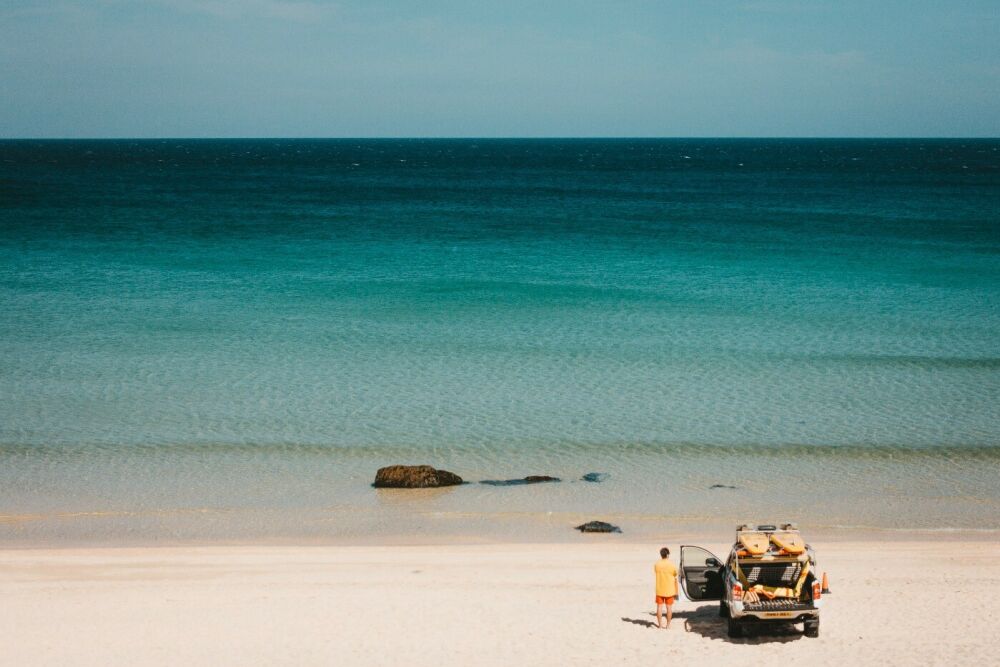The RNLI has saved more than 142,000 lives since its formation in 1824. Every year the seasonal lifeguards and volunteer boat crews protect everyone who spends time in and around the water. The RNLI's presence is essential to our safety, and having them there provides peace of mind for us all. But did you know a large proportion of these rescues were actually avoidable? By following a few simple beach safety steps, you can ensure that you and your family stay safe whilst enjoying the beautiful Cornish water.
Check out the conditions before you head for the beach.
You can stay one step ahead of the game by doing a simple conditions check before you even get to the beach. There are websites that specifically share surf forecasts and water conditions, and lots of the most popular beaches even have their own webcams so you can see what the waves are like before you arrive. Once you've assessed the conditions, plan your trip accordingly. If the wind is strong offshore, leave the inflatables behind, as you risk being blown out to sea. If the water is choppy, stay within your surfing ability and choose equipment appropriate to the conditions. Most beaches now have a surf report displayed as you arrive, and if you're not sure whether the conditions are suitable for what you've got planned, ask a lifeguard.
Understand the flags.
Most of us know that the red and yellow flags are there for swimmers and bodyboarders, but did you know there are other flags for surfers, kayakers, and even stand-up paddleboarders? The diagram below explains where you might see each of these different flags.
Most importantly of all is the red flag. If the lifeguards have chosen to fly the red flag it means that the water is too dangerous to enter, so save the surfing lesson for another day.
Riptides and strong currents.
One of the biggest dangers to swimmers and inexperienced surfers is a riptide. These almost invisible underwater currents can be strong enough to sweep even the strongest swimmer out to sea, so knowing what to expect if you get swept up by a rip is essential. The worst thing you can do is attempt to swim against the flow of the water, this will just sap your energy. Instead, stay calm and drift with the current until it loses its strength. You can then make your way safely back to shore. If you are on a surfboard or inflatable and find yourself drifting in a rip, stay on it and raise the alarm. Again, don't try and fight the rip, the sea has infinitely more energy than you do.
Rips and currents are most often found by rocks and where rivers join the sea. They usually appear calm and can be tempting to swim in, but don't be fooled by the lack of waves. Look carefully at the flow of the water and be aware of the telltale signs of a rip, and if you're unsure, don't go in.
The calm water in this picture indicates that there's probably a riptide lurking beneath the surface.
Tides.
Cornwall has a large tidal range, and the rate at which the tide rises and falls can often catch people unaware. A beautiful cove uncovered at low tide can be a dangerous inlet as the tide marches up. Always be aware of how much the sea will move, and research the high and low water tide times, especially if you are walking along the beach and risk being cut off or trapped by rising water.
Weaver fish.
These small fish with prickly spikes on their backs are becoming increasingly common in Cornwall. Whilst the effects of a sting quickly wear off, treading on one can be a painful experience. The small marine creatures bury themselves under the sand with just their spines breaking the surface, and they are more prevalent at low tide. The pain feels like a strong cramp, and treatment involves putting the affected area into hot water to break down the poison. If you are regularly surfing or swimming at a well-known weaver fish spot, you might want to consider wearing wetsuit boots or water shoes to protect your feet.
Look after each other.
If anyone does get into trouble in the water, the ability of the RNLI to conduct a rescue means that 99% of the time there is a happy ending. But they can only help you if they know you are there, so it is important to always tell someone where and when you are swimming. We'd always recommend enjoying the water on a lifeguarded beach, but if you do find yourself in the sea further off the beaten track, never swim alone. And always ensure someone is on the shore ready to raise the alarm in the highly unlikely event help is needed.
Don't swim or surf alone and always tell someone exactly where you are going.
Respect, but enjoy!
Cornwall's beaches are some of the finest in the world. And the sea is there to be enjoyed. There is no need to fear the water, and understanding how to stay safe is a crucial part of being able to experience the sea safely. The RNLI place a strong emphasis on showing respect for the water, so always stay within your limits and remain respectful; if you do, you'll have many happy hours splashing and swimming in the invigorating ocean.
To check out accommodation right on the doorstep of the beautiful Cornish coastline, visit the Padstow Breaks homepage.





